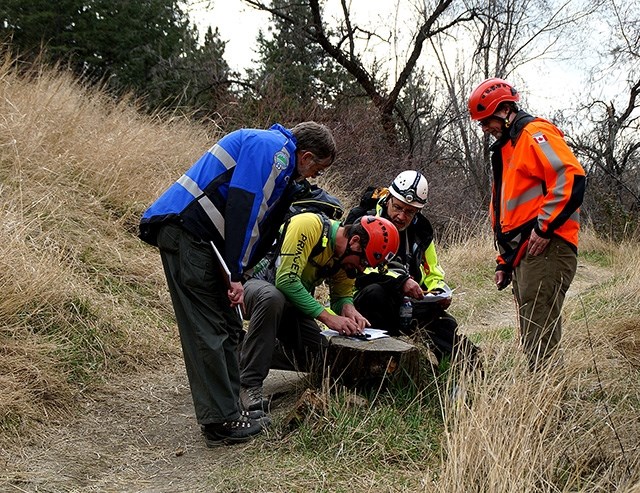
FILE PHOTO: Left to right in photo: Doug Elmore (COSAR), Kelvin Hall (PENSAR), and Emma Jameson (Princeton Search and Rescue).
Image Credit: Penticton Search and Rescue
October 11, 2021 - 2:50 PM
A new app being promoted by the RCMP and emergency dispatchers as an effective tool for backcountry adventurers is not being met with the same amount of enthusiasm from the Central Okanagan Search and Rescue team.
What3Words is a free app that divides the world into three-metre squares and assigns each with a unique combination of three random words, which allows first responders to pinpoint the exact location of an emergency.
Ed Henczel, who handles the communications side of the search and rescue team, said virtually every search and rescue group has a GPS unit, as do helicopters and the military.
Every person with a compass on their iPhone or phones using Google Maps can easily access GPS coordinates of their location, he said.
“That’s my argument for ‘let’s not reinvent the wheel.’”
There was one rescue incident recently where the team was completely turned around because of What3Words, he said. “There were some issues with the accuracy of the app.”
Roughly 70% to 80% of searchers are successfully completed following GPS, he said.
If you gave a helicopter pilot three words, “he’d probably kick you out of his helicopter,” Henczel said.
Provincially, there have been some issues with the app because you have to convert the three words into GPS coordinates, opposed to just sending screenshots of coordinates or saying them to emergency services, he said.
“B.C. Ambulance and police for the urban areas where they respond to, they might be OK with this but when it’s a wilderness search or rescue, they hand it over to us... and we want GPS,” he said. “It’s solving a problem I don’t think actually existed or needed solving.”
One of the biggest reason people need to be rescued is that they lose service and drain the batteries of their cell phones which they have been relying on to track their location, he said.
If a person calls 9-1-1, they can get through virtually on any cell tower, so having a little bit of battery is important, he said.
If rescue crews have the last known location on GPS, they can track a missing person’s location better than relying on What3Words, he said.
North Vancouver RCMP implemented the What3Words app last year.
"Before we had What3Words, it would take up to 20 minutes to locate someone because we had to work with the cell companies and there could be up to a 500 metre radius from the general coordinates they could provide," said emergency dispatcher Jodie Cohan.
READ MORE: "It's lifesaving": B.C. dispatcher encourages hikers, skiers to download new app
What3Words, she said, is a way to streamline the process. Even if the person doesn't have the app, as long as they have cell reception, emergency services can send a link that can pinpoint the caller's location.
Founder and CEO of What3Words, Chris Sheldrick, said the app can also identify a person's exact location using satellite technology without cell service. He said this has proven useful in situations where people are travelling with others in remote locations.
The app, which is available in more than 50 languages, is already being used in eight provinces and two territories, and has been implemented in more than 42 dispatch centres. In British Columbia, B.C. Emergency Health Services, who dispatch to all ambulance services in the province, have integrated What3Words into all of their systems.
In a statement issued Oct. 12, What3Words spokesperson Frankie Cowan said they will be reaching out to search and rescue teams to offer support if they haven't have positive experiences with the app.
The app is "not a replacement for having the right equipment, traditional map reading skills or calling 9-1-1 but is a useful tool in the toolbox to help communicate a location," Cowan said.
"In an emergency you should always follow local advice and dial 9-1-1 first," Cowan said. "If they are struggling to locate you with other methods, they may ask you for a what3words address. If you don’t already have the app downloaded, the handler may be able to text a URL which will display it."
In a recent survey of partner Canadian Emergency control centres, Cowan said 100% of them said the app “reduces response times when it matters most."
— With files from The Canadian Press
— This story was updated Oct. 14, 2021 at 11:30 a.m. to include a statement from What3Words.
To contact a reporter for this story, email Carli Berry or call 250-864-7494 or email the editor. You can also submit photos, videos or news tips to the newsroom and be entered to win a monthly prize draw.
We welcome your comments and opinions on our stories but play nice. We won't censor or delete comments unless they contain off-topic statements or links, unnecessary vulgarity, false facts, spam or obviously fake profiles. If you have any concerns about what you see in comments, email the editor in the link above.
News from © iNFOnews, 2021